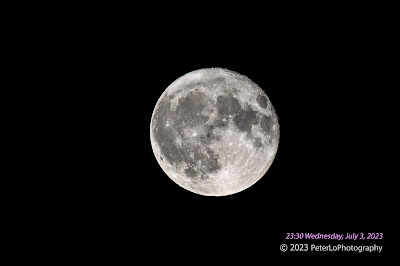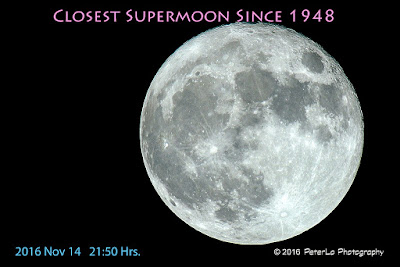The brightest Super Hunter's Moon of 2025 will occur on November 5-6. It will be the year's closest and largest supermoon, as well as the second of four consecutive supermoons.
Wednesday, November 5, 2025
Monday, October 6, 2025
Harvest Moon October 7 CUM Mid-Autumn Festival (中秋節)
The full moon on October 6-7, 2025, will be a Harvest Moon and the first supermoon of that year. This Harvest Moon will appear larger, brighter, and earlier than usual.
2025年10月6日至7日的滿月將是豐收月,也是當年的首個超級月亮。這次的豐收月將比往年更大、更亮、更早出現。
Monday, September 8, 2025
September Full Moon (Corn Moon) cum Total Lunar Eclipse
September's Corn Moon shone brightly during a total lunar eclipse, captivating stargazers worldwide. However, in Canada, the Moon will be on the opposite side of the Earth, making this September's eclipse invisible from our perspective.
We had the chance to witness a Total Lunar Eclipse earlier this year, in March 2025
Saturday, August 9, 2025
Friday, July 11, 2025
Buck Moon 2025
The Buck Moon in 2025 will be a type of supermoon, which occurs when the Moon is both full and closest to Earth. The Buck Moon earns its name because July marks the season when male deer, known as bucks, grow their magnificent antlers in full bloom.
Sunday, April 13, 2025
April's Full Pink 'Micromoon'
April's full moon in 2025 will be a micromoon, which occurs when the moon is farthest from Earth. It will be the smallest of the three micromoons, with the next one happening in May.
Thursday, January 16, 2025
Friday, October 18, 2024
The Hunter's Moon
The Hunter's Moon, also known as October’s full moon, is the third of 2024's four supermoons and the brightest of the year
Tuesday, September 17, 2024
Friday, June 21, 2024
Summer Solstice 2024 (Solar Term-夏至)
The June 21 Full moon is the Strawberry Moon on the Summer Solstice 2024 (Solar Term-夏至)
Monday, March 25, 2024
Full Moon cum Penumbral Lunar Eclipse in Toronto, Ontario
The Penumbral Lunar Eclipse Full Moon (100%) in March happens to be the Worm Moon (which can also be referred to as the Crow Moon, the Sugar Moon and the Sap Moon).
Wednesday, August 30, 2023
The 2nd Full Super Moon on August 30-31
The August 30 Blue Moon will light the sky around it, blotting out all but the brightest stars. But look carefully in the bright moonlight.
Tuesday, August 1, 2023
2023 August 1 First Full Supermoon
Canada to see rare blue supermoon and it won't happen again until 2037
The 1st full supermoon is on August 1, and the 2nd full supermoon is on August 30-31, 2923
Monday, July 3, 2023
Tuesday, February 15, 2022
Tuesday, January 18, 2022
Friday, December 24, 2021
Sunday, August 22, 2021
Sunday, September 15, 2019
Tuesday, February 26, 2019
Friday, July 27, 2018
Total Lunar Eclipse 2018
Friday, June 29, 2018
Wednesday, May 30, 2018
Saturday, March 31, 2018
2018 March 30-31 2nd Blue Moon
Sunday, March 4, 2018
2018 March 2 First Full Moon
Wednesday, January 31, 2018
Monday, August 7, 2017
Tuesday, November 15, 2016
Sunday, November 13, 2016
2016 Nov 13-14 Super-rare Supermoon
Sunday, June 19, 2016
2016 June 19 The Strawberry Moon on Father's Day
Friday, December 25, 2015
First Full Moon on Christmas since 1977
Sunday, August 30, 2015
2015 August 28 First of 3 Full Supermoons
Friday, July 3, 2015
Blue Moon of July 2015
Tuesday, June 2, 2015
2015 June 2 The Strawberry Moon
Friday, March 20, 2015
千年一遇!春分;超級月亮;日全食( 多倫多看不到)
Monday, September 8, 2014
Saturday, August 9, 2014
Most “super” supermoon of 2014 on Aug 9-10
The moon will not be so close again until the full moon of September 28, 2015. In other words, it’s not just a supermoon. It’s the closest supermoon of 2014.























































